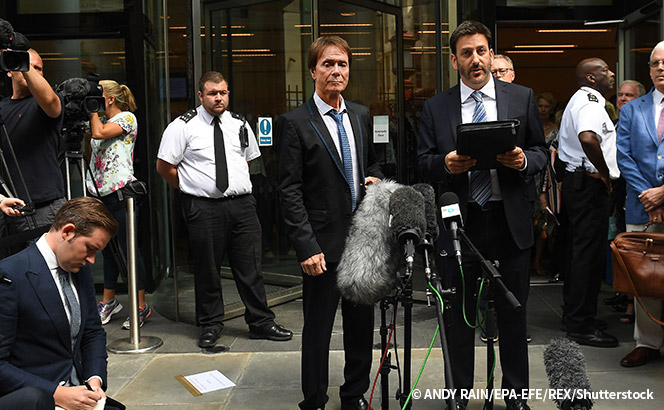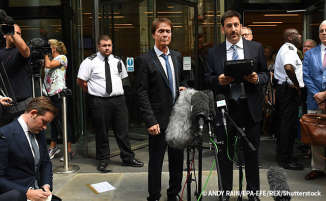Old-fashioned defamation disputes may rarely create significant precedent these days but the rapidly evolving area of privacy is a very different matter, a dynamic underlined this week in dramatic form in the conclusion of Sir Cliff Richard’s legal battle with the BBC.
The veteran celebrity’s victory in his long-running privacy case against the BBC has highlighted issues of potentially huge scope for the media and other publishers in reporting investigations against individuals.
A High Court judgment from Mr Justice Mann today (18 July) awarded Richard £210,000 in damages, after the singer sued the broadcaster for breaching his privacy in reporting that he was investigated over historical child sex abuse allegations. Richard denies the claims, for which he was not arrested and no charges were brought.
The damages, which come nearly four years after coverage of the South Yorkshire Police’s raid on Richard’s home, included a £20,000 sum for aggravated damages after the BBC nominated the story for an award. The BBC was ordered to pay 65% of the £190,000 core damages, with the South Yorkshire Police to cover the 35% balance.
The ruling attracted much attention for apparently focusing on the publication of the fact of the investigation against Richards, rather than potential aggravating factors like the prominence or ‘sensationalist’ nature of the coverage, which included aerial footage of the singer’s home.
Mann held that: ‘Knowing that Sir Cliff was under investigation might be of interest to the gossip-mongers, but it does not contribute materially to the genuine public interest in the existence of police investigations in this area. It was known that investigations were made and prosecutions brought. I do not think that knowledge of the identity of the subject of the investigation was a material legitimate addition to the stock of public knowledge for these purposes.’
BBC director of news and current affairs Fran Unsworth claimed the judgment created new case law in a dramatic shift against freedom to report on police investigations. She argued such previous reporting led to further complainants coming forward and meant police investigations and conduct could be scrutinised.
She commented: ‘We don’t believe this is compatible with liberty and press freedoms; something that has been at the heart of this country for generations.’ The BBC was considering an appeal, Unsworth added: ‘This impacts not just the BBC, but every media organisation.’
RPC partner Nicola Cain echoed the concerns, saying the media would have to ‘walk on eggshells’ when reporting police investigations in future. The judgment also further inflated privacy damages awards, with this case dwarfing the previous £60,000 record awarded in former Formula One boss Max Mosley’s case against News of the World.
Cain commented: ‘This puts the media in a very difficult position when reporting on investigations. Reporting that “Someone, somewhere, is being investigated for something” is not going to be very interesting.’
Osborne Clarke international head of digital business Ashley Hurst, however, said the more interesting aspect of the judgment was the blurring of boundaries between libel and privacy law.
‘Much will be written about the chilling effect of this case on the media’s ability to report on matters relating to crime. However, once it is accepted that a suspect in a criminal investigation has a reasonable expectation of privacy in relation to the fact that he is such a suspect, each case will turn on its facts as to whether there is a public interest justification for revealing that fact to the world.’
Hurst said the judge had found the protection of damage to reputation was part of the function of the privacy law. This allowed Richard to recover not just general damages for damage to reputation but also for certain costs incurred to mitigate damage to his reputation and financial losses suffered as a result of that damage. He commented: ‘This may lead claimants to consider bringing privacy claims instead of libel claims, particularly where the media defendant may advance a truth defence to a libel claim.’
Addleshaw Goddard partner David Engel said one of the more interesting points in the judgment related to findings made around the public’s presumption of innocence in such cases. While previous cases had said the public would consider someone innocent until proven guilty, Mann had accepted a more likely scenario.
‘The reality is people assume if you’re being investigated by the police, then there’s a reason. Being connected with these types of [sexual] offences, the very fact you are even being investigated, let alone arrested, can be very damaging, even if you are never charged or prosecuted, and you can never come back from that. This judgment’s saying that the media, and others, must respect a suspect’s right to privacy at that early stage.’
Engel said this was important given a number of cases in recent years where the media had publicised police investigations following complaints of sexual offences which ultimately went nowhere.
Richard was advised by Simkins, which instructed Justin Rushbrooke QC and Godwin Busuttil at 5RB. The BBC’s litigation department instructed Matrix Chambers’ Gavin Millar QC and Aidan Eardley, while DWF advised South Yorkshire Police, instructing Jason Beer QC and Adam Wolanski at 5 Essex Court.
hamish.mcnicol@legalease.co.uk
Click here for the full judgment
For more comment, see the media law blog, Inforrm












